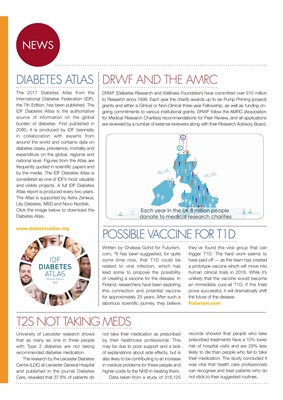
NEWS
DIABETES ATLAS DRWF (Diabetes Research and Wellness Foundation) have committed over £10 million
to Research since 1999. Each year the charity awards up to six Pump Priming (project)
grants and either a Clinical or Non-Clinical three-year Fellowship, as well as funding ongoing commitments to various institutional grants. DRWF
follow the AMRC (Association
for Medical Research Charities) recommendations for Peer Review, and all applications
are reviewed by a number of external reviewers, together with their Research Advisory
Board. For more info ont he AMRC see this video:
POSSIBLE VACCINE FOR T1D
DRWF AND THE AMRC
The 2017 Diabetes Atlas from the
International Diabetes Federation (IDF),
the 7th Edition, has been published. The
IDF Diabetes Atlas is the authoritative
resource on the global burden of diabetes.
First published in 2000, it is produced by
IDF biennially in collaboration with experts
from around the world and contains data
on diabetes cases, prevalence, mortality
and expenditure on the global, regional
and national level. Figures from the Atlas
are frequently quoted in scientific papers
and by the media. The IDF Diabetes
Atlas is considered as one of IDF's most
valuable and visible projects. A full IDF
Diabetes Atlas report is produced every
two years. The Atlas is supported by
Astra Zeneca, Lilly Diabetes, MSD and
Novo Nordisk.
www.diabetesatlas.org
Written by Chelsea Gohd for Futurism.
com, "It has been suggested, for quite
some time now, that T1D could be
related to viral infection, which has
lead some to propose the possibility
of creating a vaccine for the disease. In
Finland, researchers have been exploring
this connection and potential vaccine
for approximately 25 years. After such a
laborious scientific journey, they believe
they've found the viral group that can
trigger T1D. The hard work seems to
have paid off - as the team has created
a prototype vaccine which will move into
human clinical trials in 2018. While it's
unlikely that the vaccine would become
an immediate cure-all T1D, if the trials
prove successful, it will dramatically shift
the future of the disease.
Futurism.com
T2S NOT TAKING MEDS
University of Leicester research shows
that as many as one in three people
with Type 2 diabetes are not taking
recommended diabetes medication.
The research by the Leicester Diabetes
Centre (LDC) at Leicester General Hospital
and published in the journal Diabetes
Care, revealed that 37.8% of patients do
not take their medication as prescribed
by their healthcare professional. This
may be due to poor support and a lack
of explanations about side effects, but is
also likely to be contributing to an increase
in medical problems for these people and
higher costs to the NHS in treating them.
Data taken from a study of 318,125
records showed that people who take
prescribed treatments have a 10% lower
risk of hospital visits and are 28% less
likely to die than people who fail to take
their medication. The study concluded it
was vital that health care professionals
can recognise and treat patients who do
not stick to their suggested routines.